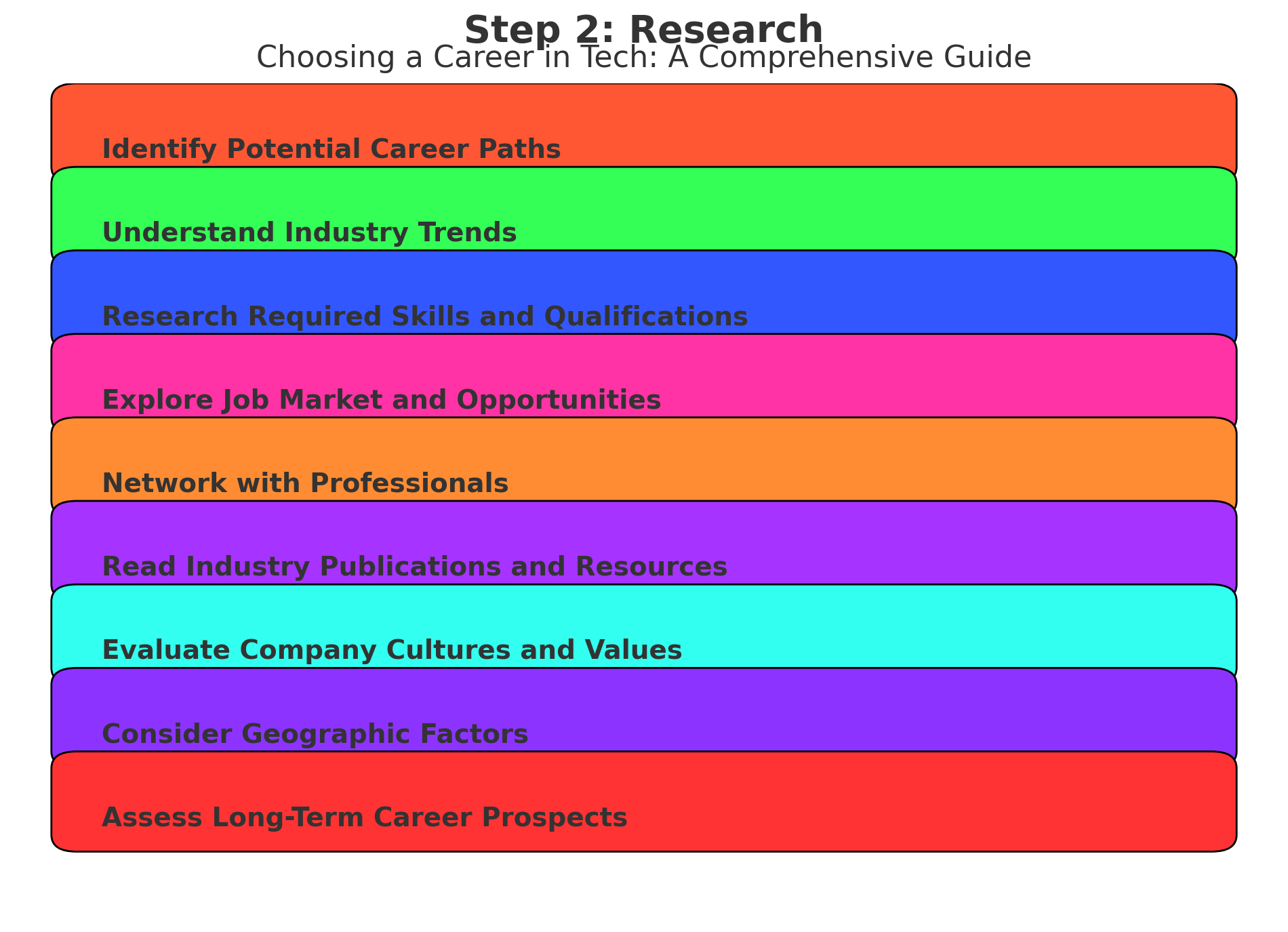Step 2: Research "Choosing a Career in Tech: A Comprehensive Guide"
Latest News Monday, July 1, 2024

After conducting a thorough self-assessment, the next step in choosing a career in tech is to dive into research. This step is crucial as it helps you understand the various roles available, the current and future trends in the industry, and the job market demand. By equipping yourself with this knowledge, you can make informed decisions that align with your interests, skills, and career goals.
Exploring Different Tech Roles
The tech industry is vast and diverse, with a multitude of career paths to explore. Here are some of the most prominent roles:
1. Software Developer/Engineer: Focuses on designing, coding, and testing software applications. Languages such as Java, Python, and C++ are commonly used.
2. Data Scientist/Analyst: Specializes in analyzing and interpreting complex data to help organizations make informed decisions. Key skills include statistical analysis, machine learning, and proficiency in tools like Python, R, and SQL.
3. Cybersecurity Analyst: Protects an organization’s systems and data from cyber threats. Knowledge of network security, ethical hacking, and cybersecurity frameworks is essential.
4. UX/UI Designer: Enhances user experience and interface design for digital products. Proficiency in design tools like Adobe XD, Sketch, and Figma is often required.
5. IT Support Specialist: Provides technical support and troubleshooting for hardware and software issues. Familiarity with various operating systems and strong problem-solving skills are crucial.
Understanding Industry Trends
Keeping up with industry trends helps you stay relevant and identify emerging opportunities. Here are some current and future trends to watch:
1. Artificial Intelligence (AI) and Machine Learning (ML): AI and ML are transforming industries by automating processes and providing predictive insights. Roles in AI and ML require knowledge of algorithms, data structures, and programming languages like Python and R.
2. Cloud Computing: As more organizations migrate to the cloud, expertise in platforms like AWS, Azure, and Google Cloud is in high demand. Cloud computing roles include cloud architects, cloud engineers, and cloud security specialists.
3. Blockchain Technology: Blockchain is revolutionizing sectors like finance, supply chain, and healthcare by providing secure and transparent transactions. Blockchain developers and architects are needed to build and maintain these systems.
4. Internet of Things (IoT): IoT connects physical devices to the internet, enabling data collection and communication. IoT engineers and developers work on integrating sensors, devices, and networks.
5. Cybersecurity: With the increasing number of cyber threats, the demand for cybersecurity professionals continues to grow. Staying updated with the latest security protocols and threats is essential.
Researching the Job Market
Understanding the job market is vital for identifying which roles are in demand and where the opportunities lie. Here are some tips:
1. Job Portals: Use job portals like LinkedIn, Indeed, and Glassdoor to search for tech roles. Pay attention to the job descriptions, required skills, and qualifications.
2. Company Websites: Visit the careers pages of companies you’re interested in to see the roles they are hiring for. This can give you insights into what specific companies are looking for.
3. Industry Reports: Read industry reports from organizations like Gartner, McKinsey, and Deloitte. These reports provide valuable data on market trends, emerging technologies, and job outlook.
4. Networking: Connect with professionals in the tech industry through networking events, meetups, and online communities. Engaging with industry insiders can provide firsthand information about job opportunities and market demands.
Identifying Growth Opportunities
As you research, identify areas with high growth potential that align with your interests and skills. Consider the following:
1. Startups vs. Established Companies: Startups offer the chance to wear multiple hats and rapidly grow your skills, while established companies provide stability and well-defined career paths.
2. Emerging Technologies: Focus on emerging technologies that are expected to have a significant impact in the future. Specializing in these areas can give you a competitive edge.
3. Geographic Considerations: Some regions, like Silicon Valley, Seattle, and Austin, are known tech hubs with a high concentration of job opportunities. However, remote work is becoming increasingly prevalent, offering more flexibility in location.
Taking Action
Armed with your research, you can now take concrete steps towards your tech career:
1. Skill Development: Identify the skills required for your desired roles and invest in learning through courses, bootcamps, and self-study.
2. Networking: Build connections with industry professionals and join relevant communities to stay updated on trends and job opportunities.
3. Certifications: Obtain certifications that are highly regarded in your chosen field to enhance your credibility and marketability.
4. Experience: Look for internships, freelance projects, or volunteer opportunities to gain practical experience and build your portfolio.
Conclusion
Research is a critical step in choosing a career in tech. By exploring different roles, understanding industry trends, and researching the job market, you can make informed decisions that align with your interests and skills. This comprehensive understanding will not only help you identify the right career path but also prepare you for a successful and fulfilling career in the tech industry. Stay curious, stay informed, and let your research guide you towards a promising future in tech.
0 Comments:
Leave A Comment